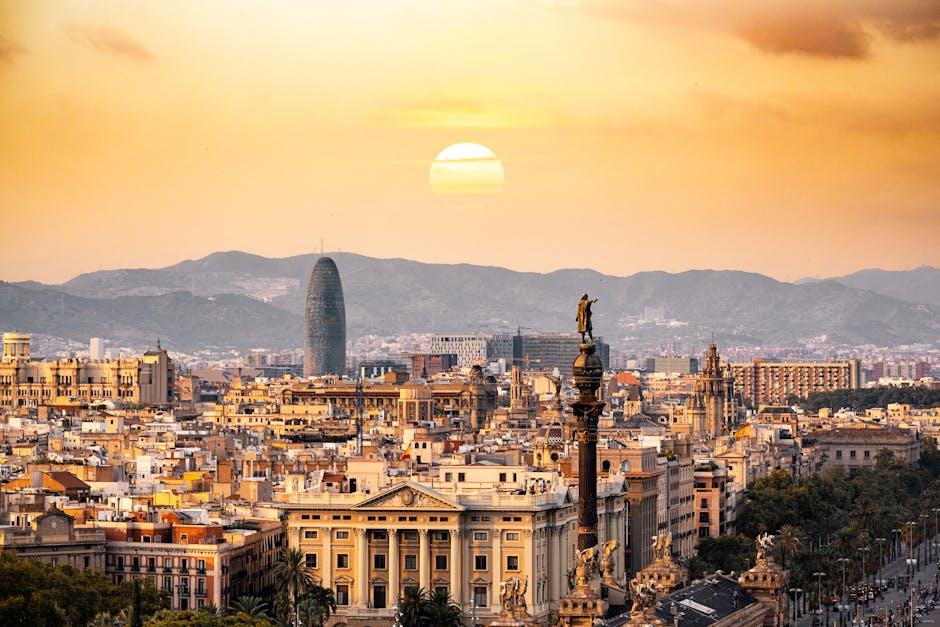In the diverse tapestry of European migration policy, the threads of opportunity and restriction are interwoven, crafting patterns that tell tales of hope, ambition, and sometimes, abrupt endings. Spain’s golden visa, a gleaming strand in this complex weave, has long been a beacon for non-EU citizens seeking the warmth of the Mediterranean sun, a slice of vibrant culture, and a gateway to unrestricted movement across the Schengen area.
However, like all tales of golden opportunities, the narrative is undergoing a significant twist. The end of Spain’s golden visa program marks a pivotal shift in the silhouette of immigration and investment within the country and poses pressing questions about the future landscape for foreigners drawn to its shores. Balancing on the cusp of change, individuals who once eyed Spain as a golden-ticket destination now face a tapestry of uncertainty and adaptation.
Join us as we unravel the implications of this policy change, exploring what the end of Spain’s golden visa means for foreigners. Through a nuanced examination, we’ll delve into the heart of the matter, shedding light on the perspectives of those affected, the motivations behind the policy’s conclusion, and what the future may hold in a post-golden visa era. This is not just a story of policy shifts; it’s a reflection on dreams, opportunities, and the ever-evolving journey of finding a place to call home in a world brimming with borders.
Unveiling the Closure: The Impact on Global Mobility
The cessation of Spain’s golden visa, a coveted gateway for foreigners looking to gain residency through investment, marks a pivotal moment in the narrative of global mobility. This move does not merely alter the landscape of immigration and residency in Spain; it sends ripples across the globe, affecting how potential investors strategize their moves in the chess game of international relocation. Countries that have been traditionally viewed as secondary options might see a resurgence in interest, as erstwhile hopefuls for the Spanish golden visa pivot to alternative pathways for securing a foothold in Europe and beyond. The realignment may also prompt a renewed scrutiny of the investment visa policies worldwide, as other nations observe the outcomes of Spain’s bold decision.
In the wake of this development, the community of expatriates, investors, and legal advisors finds itself at the brink of a transformation. Prospective applicants must now navigate a reshaped terrain, where the nuances of bilateral agreements, tax implications, and residency prerequisites in other countries become paramount. To aid in this transition, consider the following insights:
- Explore Alternatives: Countries like Portugal and Greece offer their versions of a golden visa, which might emerge as attractive destinations with their own unique set of benefits and requirements.
- Seek Legal Counsel: Navigating the post-golden visa era demands expert advice to ensure compliance with the new legal frameworks and to uncover potential opportunities.
- Analyze Long-term Implications: Reflect on how the shift affects long-term residency plans, considering factors such as permanent residency prospects, citizenship options, and the impact on future generations.
The alteration in Spain’s policy is more than a mere regulatory adjustment; it’s a testament to the evolving dynamics of global migration and investment landscapes. As the dust settles, adaptability and foresight will be key in maneuvering through the new realities of global mobility.
From Golden Shores to New Horizons: Alternatives to the Spanish Golden Visa
As the sun sets on Spain’s popular Golden Visa program, a panorama of alternatives unfolds for prospective investors and adventurers seeking new residence opportunities beyond the Iberian Peninsula. Troubadours of modernity might find solace in the verdant hills of Portugal, where the Golden Visa program offers a similar promise of residence in exchange for investment, albeit with a touch of Lusitanian charm. Others, looking farther afield, could set their compass towards the tranquil azure waters of the Caribbean, with countries like Antigua and Barbuda presenting a tropical tableau and an expedited path to citizenship through investment in real estate or donations to national development funds.
Venturing into the heartlands of Europe, the scenic beauty of Greece’s Golden Visa program emerges as a contender, inviting investment in real estate for a piece of Mediterranean paradise paired with EU residency. Meanwhile, the pioneering spirits may be intrigued by the burgeoning opportunities in the tech-savvy nation of Estonia, which, through its e-Residency program, offers a digital nomad visa – a beacon for entrepreneurs of the digital age, albeit without offering physical residency. This kaleidoscope of alternatives showcases a world brimming with potential, where the end of one opportunity merely signals the beginning of myriad new adventures across the globe.
| Country | Program | Minimum Investment Requirement |
|---|---|---|
| Portugal | Golden Visa | €500,000 in real estate |
| Antigua and Barbuda | Citizenship by Investment | $100,000 donation or $400,000 in real estate |
| Greece | Golden Visa | €250,000 in real estate |
| Estonia | Digital Nomad Visa | Proof of €3504 monthly income |
As we sift through these bold new landscapes of opportunity, it becomes clear that the horizon is only as limited as our imaginations. Whether it’s through the sanctuaries of innovation, the bastions of historical legacy, or the havens of natural splendor, each country presents a unique tapestry of experiences and incentives. The cessation of Spain’s Golden Visa might be a siren call to explore, to discover, and perhaps, to find a new place to call home in this vast, vibrant world.
Navigating the Aftermath: Strategies for Affected Foreign Investors
In the wake of Spain’s decision to discontinue its golden visa program, foreign investors are finding themselves in a landscape that has significantly shifted beneath their feet. This pivot away from a scheme that allowed capital to funnel in through real estate and other investments, in exchange for residency rights, necessitates a recalibration of strategies for those international stakeholders still keen on maintaining a foothold in the Spanish market. Firstly, explore alternative residency programs that Spain may offer, which could include options for entrepreneurs, highly skilled professionals, or non-lucrative visas for individuals who can prove sufficient financial means without engaging in employment within the country.
Adapting to this new reality also means considering broader investment horizons within the European Union, where other nations may still offer golden visa equivalents or programs with similar benefits. Reassessing asset allocations and regional focus can uncover new opportunities, potentially offering not just residency perks but also diversification benefits. Cross-border legal and tax advice becomes paramount in this context, as navigating the complexities of international investment often requires expert guidance. Below is a simplified overview of potential next steps for investors seeking alternatives:
- Research alternative residency programs – Specifics vary by country, but many offer pathways for entrepreneurs, retirees, or those with significant financial resources.
- Diversification of investments – Look beyond real estate to other asset classes or business investments that might offer stable returns and potential residency or citizenship advantages.
- Seek professional advice – Understand the legal and fiscal implications of any new investment or residency strategy with the help of experts.
| Country | Program Type | Minimum Investment |
|---|---|---|
| Portugal | Golden Visa | €350,000+ |
| Greece | Golden Visa | €250,000+ |
| Italy | Investor Visa | €250,000+ |
By shifting focus and adapting strategies, foreign investors can navigate the post-golden visa era in Spain with resilience and foresight, finding new avenues for growth and security in an evolving European investment landscape.
The Future of Residency by Investment: What Comes Next for Spain and Beyond
As Spain concludes its golden visa program, an era of relatively straightforward residency by investment comes to an end, leaving potential investors and foreign nationals pondering their next steps. The closure of this program, which granted residency to non-EU investors in exchange for significant real estate investments, has repercussions not only within Spain but also sets a precedent for similar schemes across other countries. Future seekers of residency by investment must now navigate a transformed landscape, where alternative programs may not offer the same allure or benefits. This shift demands a closer examination of what lies ahead for those still aiming to secure a residency through investment, especially in nations that continue to welcome foreign capital with open arms.
Within this evolving scenario, several countries emerge as noteworthy contenders, ready to fill the gap left by Spain’s golden visa program. For instance, Portugal’s Golden Visa and Greece’s Golden Visa program remain attractive options, offering similar benefits in terms of residency rights and potential pathways to citizenship. Investors now face the task of comparing these alternatives, considering factors such as investment thresholds, types of investable assets, and residency requirements. The table below offers a concise comparison to aid this analysis:
| Country | Minimum Investment Requirement | Residency Requirement | Pathway to Citizenship |
|---|---|---|---|
| Portugal | €280,000 - €500,000 | Stay requirement of 7 days in the first year and 14 days in subsequent two-year periods | After 5 years |
| Greece | €250,000 | None | After 7 years |
The departure of Spain’s golden visa ushers in a period of critical reflection and adjustment for both countries and investors. As these investment landscapes adapt, they present a new set of challenges and opportunities. For countries, the task lies in crafting residency programs that can attract foreign investment without stirring public controversy or straining local resources. For investors, the key is to meticulously assess each program, not just for the potential returns on investment, but also for the stability and benefits of the residency status they confer. As the dust settles, the resilience and adaptability of both parties will inevitably shape the future contours of residency by investment programs worldwide.
Future Outlook
As the sun sets on Spain’s golden visa program, the reactions and repercussions ripple through the corazónes of those it affects most — foreign investors and dreamers alike. Like the final chord in a passionate flamenco performance, the termination of this initiative marks a moment of transformation, a change in tempo for many looking to intertwine their futures with the vibrant tapestry of Spanish life. Yet, as we bid adiós to this era, we open our arms to a future where adaptability, creativity, and understanding will guide the path for those seeking new horizons. Spain, with its rich history of navigating the ebb and flow of change, invites us to reflect not on what has been lost, but on what new legacies can be built amid shifting sands. As the curtain falls and the lights dim on the golden visa, the stage is set for the next act — a tale of resilience, hope, and the enduring quest for a place to call home under the Iberian sky. Let us watch with eager eyes what unfolds, for in endings, we often find the seeds of new beginnings.




